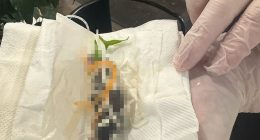US taxpayers supported research in three Chinese labs that included risky gain-of-function experiments with coronaviruses at the Wuhan Institute of Virology, a new government report found Wednesday.
The National Institutes of Health (NIH) and US Agency for International Development (USAID) provided $2,168,345 in grant funding to the Chinese research institutions between 2014 and 2021, according to the Government Accountability Office.
The report shows $1,413,720 in subgrants allocated by the Manhattan-based EcoHealth Alliance went to the Wuhan Institute of Virology, where hazardous research was conducted on bat coronaviruses.
Chinese scientists Ben Hu, Ping Yu and Yan Zhu were the first humans to contract COVID-19 while at the lab researching how to increase infectiousness and make pathogens stronger, according to a Tuesday report from Substack journalists Michael Shellenberger and Matt Taibbi.

The FBI and Energy Department have both assessed the so-called “lab leak theory” as the most likely explanation for the origins of the COVID-19 pandemic.
“Today, the GAO confirmed that US taxpayer dollars awarded from the National Institutes of Health and USAID were ultimately used for research by entities in China, including the Wuhan Institute of Virology, which was known to be doing coronavirus research,” said House Permanent Select Committee on Intelligence Chairman Mike Turner (R-Ohio) and House Select Subcommittee on the Coronavirus Pandemic Chairman Brad Wenstrup (R-Ohio) in a joint statement.
“This revelation is very concerning due to the increased focus on the ‘lab leak’ theory, which suggests that the virus may have originated from the Wuhan laboratory rather than through natural means,” they added. “We have long argued that the American people deserve the truth about COVID-19’s origin and continue to take concrete actions to declassify intelligence related to the pandemic.”

The funding figure may not reflect the full amount, since sub-awards of fewer than $30,000 don’t need to be reported in government records.
“For the NIH-funded award to EcoHealth Alliance, among other activities, [Wuhan Institute of Virology]’s activities included genetic experiments to combine naturally occurring bat coronaviruses with SARS and MERS viruses, resulting in hybridized (also known as chimeric) coronavirus strains,” the report says.
Lawrence A. Tabak, NIH’s principal deputy director, wrote in an October 2021 letter that EcoHealth had funded gain-of-function experiments involving “spike proteins from naturally occurring bat coronaviruses circulating in China were capable of binding to the human ACE2 receptor in a mouse model.”

Dr. Anthony Fauci, the former director of NIH’s National Institute of Allergy and Infectious Diseases, had denied to Congress earlier that year that US funding went to the controversial research project, calling it “a modest collaboration with very respectable Chinese scientists who were world experts on coronavirus.”
Fauci, who retired at the end of last year, tangled with Sen. Rand Paul (R-Ky.) in particular over the research, telling the senator during a May 11, 2021, hearing that he was “entirely and completely incorrect that the NIH has not never and does not now fund gain-of-function research in the Wuhan Institute of Virology.”
Fauci has also repeatedly downplayed evidence of a lab leak and argued for the likelihood of SARS-CoV-2 occurring naturally.
Read Related Also: Paul Ryan is dead wrong on culture war

In another hearing on May 25, 2021, former NIH Director Dr. Francis Collins told Rep. Andy Harris (R-Md.) that researchers at the Wuhan lab “were not approved by NIH for doing ‘gain of function research.’”
“We are, of course, not aware of other sources of funds or other activities they might have undertaken outside of what our approved grant allowed,” Collins added.
A Department of Defense spending bill for fiscal year 2024 would force the Pentagon to cut funding to the Wuhan Institute of Virology, as well as all EcoHealth grant projects in China.
NIH and USAID also sent $240,496 through the University of California, Davis and EcoHealth Alliance to Wuhan University. NIH directly gave $200,000 to the university over the same time period.

Another $514,129 went from NIH through Duke University to China’s Academy of Military Medical Sciences to research malaria, tuberculosis and influenza.
Wuhan University collaborated with the Wuhan Institute of Virology for its research on viral detection and collected biological samples from people who were exposed to bats and experienced “unusual illness,” the report also says.
Sen. Roger Marshall (R-Kan.) conducted a separate investigation in March that found the US government through EcoHealth may have paid millions more by duplicating grants it doled out to the Wuhan-based research institutions.

EcoHealth Alliance President and CEO Peter Daszak disputed the findings, saying the projects were “complementary” and did “not involve duplication of effort.”
Sen. Joni Ernst (R-Iowa) has drawn attention to EcoHealth receiving hundreds of thousands of dollars more in grant money since the pandemic, and her staff in a separate analysis reported that the Wuhan Institute of Virology had received up to $2 million from the US.
“Washington is losing track of Americans’ hard-earned taxpayer dollars. It is unbelievable that three years later, we are still trying to figure out exactly how many US tax dollars were spent in China’s state-run Wuhan Institute of Virology,” Ernst told The Post.
Daszak also insisted the funds had not gone to “risky research” and that the now-released GAO report would show the funding from NIH and USAID to the Wuhan Institute amounted to “less than $1.3 million”. He did not respond to a request for comment Wednesday.
Marshall’s office relayed its findings to the Office of the Inspector General for USAID, which has yet to issue a report of its own. The office declined to comment when contacted by The Post.









